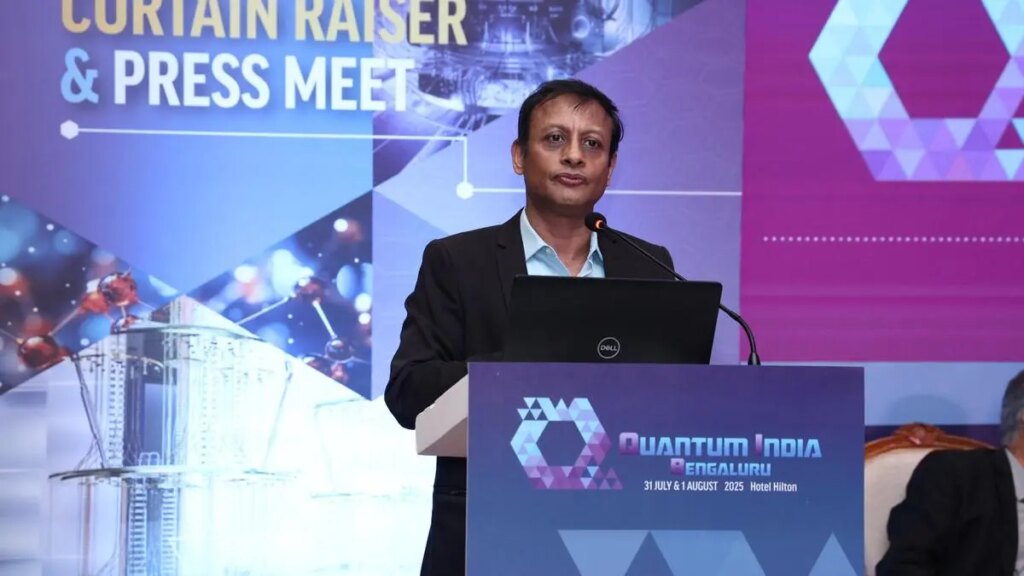
Prof. Arindam Ghosh, Conference Chair of QIB 2025 and IISc Bengaluru professor
India has secured over $800 million in quantum computing investments, says Prof. Arindam Ghosh, Conference Chair of QIB 2025 and IISc Bengaluru professor, highlighting a significant government contribution but a lag in private funding.
Speaking on the sidelines of the Curtain Raiser for the Quantum India Bengaluru Summit (QIB 2025), he explained, “Cumulatively, India received about₹4,000 crore from the Department Of Science & Technology (DST), about ₹1,200 crore from Defence Research and Development Organisation (DRDO), from ISRO. However, China has a stronger investment in quantum computing and quantum communication. Theirs is at least five times more than any other country, giving them an advantage in the communication space.”
In April 2023, the country’s Union Cabinet approved the National Quantum Mission (NQM), an initiative by the Government of India to propel the nation to the forefront of quantum technology research and development. As part of this mission, set to span from 2023–24 to 2030–31, India will dedicate a budget allocation of ₹6,003.65 crore to the cause.
On the other hand, private venture companies are also slowly taking note of this technology, he said. “Our goal is to sensitise VC players. We receive inquiries about their interest in investing in quantum startups. There will be a significant enhancement in the VCs becoming active only if we can come up with a use case, like in healthcare and other areas,”
Quantum computing race
In the US, large tech firms like Google, Microsoft, and IBM are competing among themselves to win the quantum computing race. Alongside, the US government has also given over $1.2 billion as seed funding to develop the quantum ecosystem, the professor said.
“For quantum computing to become a reality in India, large companies need to see business value in it—that’s when the ecosystem will truly take off. So far, progress hasn’t happened at the pace or scale we had hoped, but I believe that will change. At present, quantum startups largely rely on shared infrastructure. As they scale, they’ll be able to set up their own in-house capabilities, including quantum processors. We’re building shared infrastructure units that startups can access to validate their ideas and attract investor interest,” he said.
Ghosh also highlighted that India must create hardware for self-reliance, without which the country will be at a disadvantage both strategically and security-wise.
“We keep urging DRDO and other institutions to invest in quantum technologies. Whether or not it leads to immediate commercialisation, the investment needs to happen now. Unlike AI, where GPUs can be sourced at a relatively low cost, quantum computing poses strategic challenges. Even if you approach a company tomorrow and request a 1000-qubit processor, the host country can refuse supply,” he said.
In June 2025, the Karnataka Cabinet, chaired by Chief Minister Siddaramaiah, approved the establishment of the second phase of the Quantum Research Park in Bengaluru, in collaboration with the Indian Institute of Science (IISc).
The park, which will be developed on the IISc campus with an allocation of ₹48 crore, will enable the creation of advanced infrastructure, enhance research and development capabilities, and nurture a skilled quantum-ready workforce. It will provide shared access to laboratories and research equipment and function as a hub for academia, start-ups, and industry to collaborate on next-generation quantum technologies.
Alongside, the global quantum workforce may exceed 200,000 by the end of 2030. However, this number may not be transferable to India till the ecosystem is developed.
“Here, that number can be larger because, at the current stage, our hardware development needs more people. We need to have some form of a snowballing effect in creating human resources,” the professor noted.
Published on July 9, 2025

